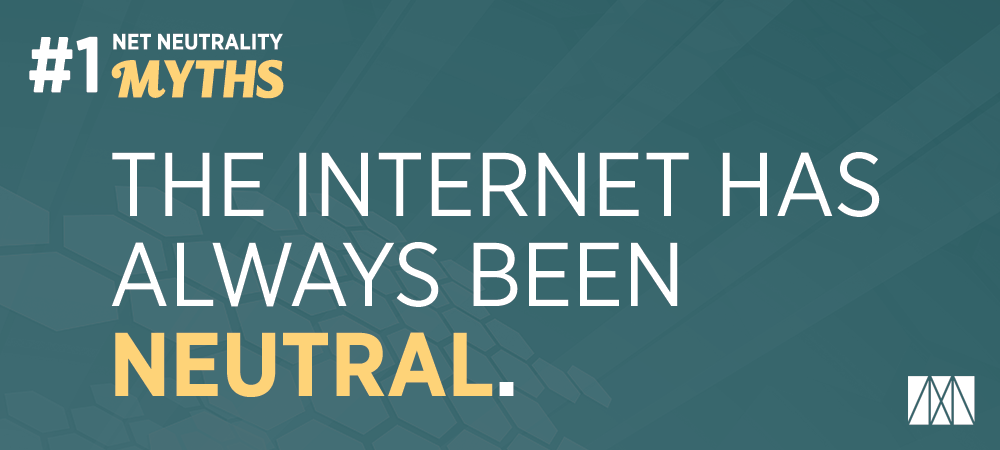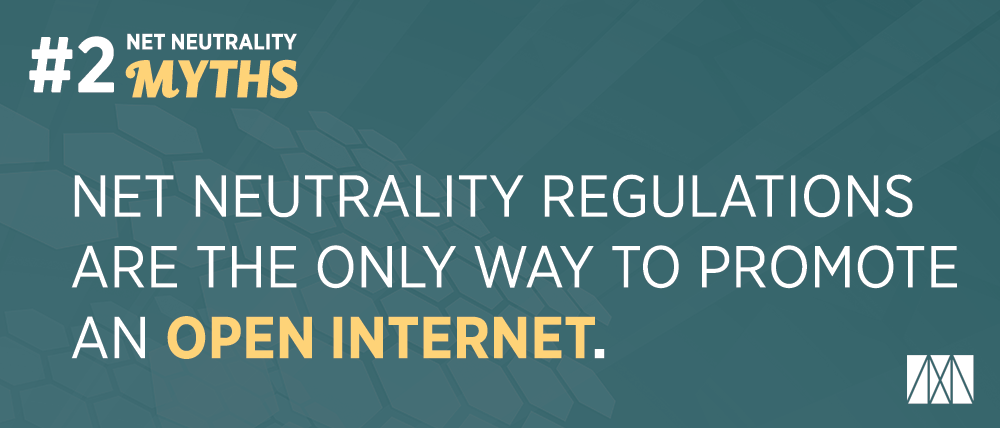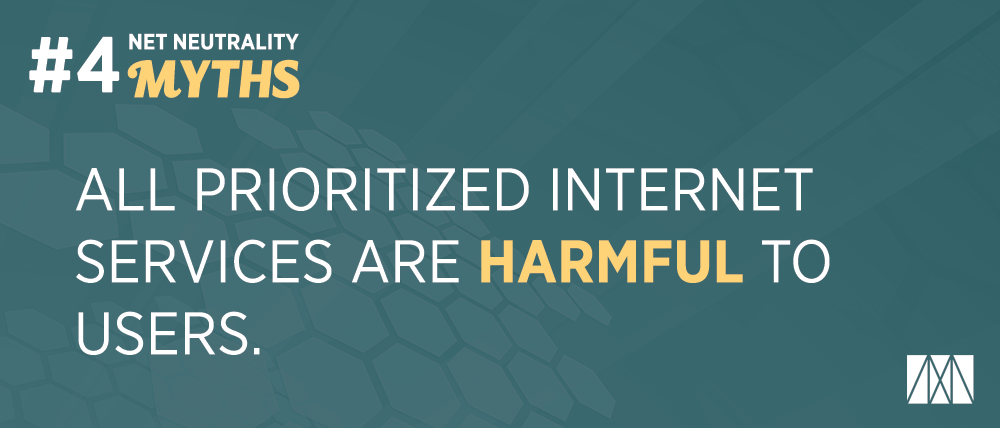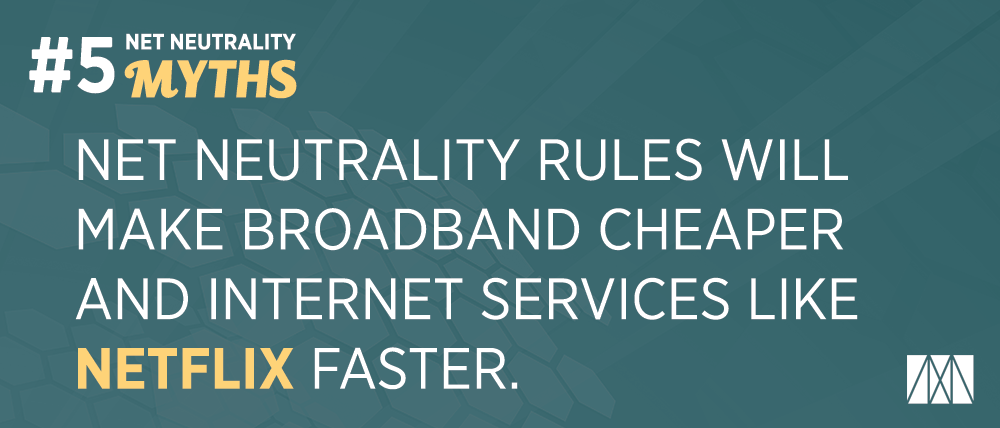- | Technology and Innovation Technology and Innovation
- | Expert Commentary Expert Commentary
- |
Five Myths about Net Neutrality
Brent Skorup debunks five myths surrounding net neutrality: the Internet has always been neutral; net neutrality regulations are the only way to promote an open Internet; net neutrality regulations improve broadband competition; all prioritized Internet services are harmful to users; net neutrality rules will make broadband cheaper and Internet services like Netflix faster.
In view of the Federal Communications Commission (FCC) vote on February 26 to regulate the Internet under Title II of the New Deal–era Communications Act, it is critical to understand what these “net neutrality” rules will and will not do.
Columbia Business School professor Eli Noam says net neutrality has “at least seven different related but distinctive meanings….” The consensus is, however, that net neutrality is a principle for how an Internet Service Provider (ISP) or wireless carrier treats Internet traffic on “last mile” access — the connection between an ISP and its customer. Purists believe net neutrality requires ISPs to treat all last-mile Internet traffic the same. The FCC will not enforce that radical notion because networks are becoming more “intelligent” every year and, as a Cisco network engineer recently put it, equal treatment for all data packets “would be setting the industry back 20 years.”
Nevertheless, because similar rules were twice struck down in federal court, the FCC is crafting new net neutrality rules for ISPs and technology companies. Many of these Title II provisions reined in the old Bell telephone monopoly and are the most intrusive rules available to the FCC. The net neutrality rules are garnering increased public scrutiny because they will apply to one of the few bright spots in the US economy — the technology and communications sector.
As with many complex concepts, there are many myths about net neutrality. Five of the most widespread ones are dispelled below.
Myth #1: The Internet Has Always Been Neutral
Reality: Prioritization has been built into Internet protocols for years. MIT computer scientist and early Internet developer David Clark colorfully dismissed this first myth as “happy little bunny rabbit dreams,” and pointed out that “[t]he network is not neutral and never has been.” Experts such as tech entrepreneur and investor Mark Cuban and President Obama’s former chief technology officer Aneesh Chopra have observed that the need for prioritization of some traffic increases as Internet services grow more diverse. People speaking face-to-face online with doctors through new telemedicine video applications, for instance, should not be disrupted by once-a-day data backups. ISPs and tech companies should be free to experiment with new broadband services without time-consuming regulatory approval from the FCC. John Oliver, The Oatmeal, and net neutrality activists, therefore, are simply wrong about the nature of the Internet.
Myth #2: Net Neutrality Regulations Are the Only Way to Promote an Open Internet 
Reality: Even while lightly regulated, the Internet will remain open because consumers demand an open Internet. Recent Rasmussen polling indicates the vast majority of Americans enjoy the open Internet they currently receive and rate their Internet service as good or excellent. (Only a small fraction, 5 percent, says their Internet quality is “poor.”) It is in ISPs’ interest to provide high-quality Internet just as it is in smartphone companies’ interest to provide great phones and automakers’ interest to build reliable cars. Additionally, it is false when high-profile scholars and activists say there is no “cop on the beat” overseeing Internet companies. As Federal Trade Commissioner Joshua Wright testified to Congress, existing federal competition laws and consumer protection laws — and strict penalties — protect Americans from harmful ISP behavior.
Myth #3: Net Neutrality Regulations Improve Broadband Competition
Reality: The FCC’s net neutrality rules are not an effective way to improve broadband competition. Net neutrality is a principle for ISP treatment of Internet traffic on the “last mile” — the connection between an ISP and a consumer. The principle says nothing about broadband competition and will not increase the number of broadband choices for consumers. On the contrary, net neutrality as a policy goal was created because many scholars did not believe more broadband choices could ensure a “neutral” Internet. Further, Supreme Court decisions lead scholars to conclude that “as prescriptive regulation of a field waxes, antitrust enforcement must wane.” Therefore, the FCC’s net neutrality rules would actually impede antitrust agencies from protecting consumers.
Myth #4: All Prioritized Internet Services Are Harmful to Users
Reality: Intelligent management of Internet traffic and prioritization provide useful services to consumers. Net neutrality proponents call zero-rating — which is when carriers allow Internet services that don’t subtract from a monthly data allotment — and similar practices “dangerous,” “malignant,” and rights violations. This hyperbole arises from dogma, not facts. The real-world use of prioritization and zero-rating is encouraging and pro-consumer. Studies show that zero-rated applications are used by millions of people around the globe, including in the United States, and they are popular. In one instance, poor South African high school students petitioned their carriers for free — zero-rated — Wikipedia access because accessing Wikipedia frequently for homework was expensive. Upon hearing the students’ plight, Wikipedia and South African carriers happily obliged. Net neutrality rules like Title II would prohibit popular services like zero-rating and intelligent network management that makes more services available.
Myth #5: Net Neutrality Rules Will Make Broadband Cheaper and Internet Services like Netflix Faster
Reality: First, the FCC’s rules will make broadband more expensive, not cheaper. The rules regulate Internet companies much like telephone companies and therefore federal and state telephone fees will eventually apply to Internet bills. According to preliminary estimates, millions of Americans will drop or never subscribe to an Internet connection because of these price hikes. Second, the FCC’s rules will not make Netflix and webpages faster. The FCC rules do not require ISPs to increase the capacity or speed of customers’ connections. Capacity upgrades require competition and ISP investment, which may be harmed by the FCC’s onerous new rules.